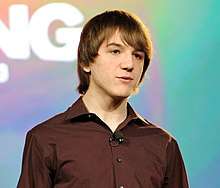Jack Andraka
| Jack Andraka | |
|---|---|
 Andraka in 2013 | |
| Born |
Jack Thomas Andraka January 8, 1997 Crownsville, Maryland, U.S. |
| Residence | United States |
| Nationality | American |
| Scientific career | |
| Fields | Cancer research, medical research, invention |
Jack Thomas Andraka (born January 8, 1997) is an American inventor, scientist, and cancer researcher. He is known for his award-winning work on a potential method for possibly detecting the early stages of pancreatic and other cancers, which he performed while he was a high school student. The validity of his research has since been questioned by other scientists. Since 2015, he has attended Stanford University as an undergraduate.
Pancreatic cancer sensor
According to Andraka, he invented a new type of sensor, similar to diabetic test strips, for early-stage pancreatic cancer screening. This paper sensor measures the level of mesothelin (a suspected cancer biomarker) in a sample to test for the presence of cancer in a patient. Andraka coated strips of filter paper with a mixture of single-walled carbon nanotubes, which made the paper conductive, and antibodies against human mesothelin. Samples containing mesothelin were applied to these paper test strips, and the binding of mesothelin to the antibody was quantified by measuring changes in the electrical properties of the strip.[1]
Andraka said that tests on human blood serum obtained from both healthy people and patients with chronic pancreatitis, pancreatic intraepithelial neoplasia (a precursor to pancreatic carcinoma), or pancreatic cancer showed a dose-dependent response. According to him, his method is 168 times faster, 1⁄26667 times as expensive, and 400 times more sensitive than ELISA, 25% to 50% more accurate than the CA19-9 test,[2] and over 90 percent accurate in detecting the presence of mesothelin.[3]
Several years of trials would be needed to determine whether testing for with Adraka's device would be sensitive and specific enough to do more harm than good as a screening test for pancreatic cancer; if it is not sensitive enough too many cases would be missed, and if it is not specific enough there would be too much follow on testing for people who didn't need it.[4]
He has applied for a patent for his method of sensing pancreatic cancer and as of 2012 was communicating with companies about developing an over-the-counter test.[5][6]
Background
Andraka has given a number of accounts of what inspired him to work on pancreatic cancer, including the death of a family friend whom he described as almost an uncle.[7][8][9] He has told these various narratives as recently as his talk in TEDx Nijmegen 2013.[10]
Andraka learned from the work of many previous scientists that one reason for the poor survival rate from pancreatic cancer was the lack of early detection and an effective screening method.[2] He says that he was undeterred due to his teenage optimism, and he went on to consult "a teenager's two best friends: Google and Wikipedia",[11] as well as drawing upon content from YouTube.[12] He began to think of various ways of detecting and preventing cancer growth and terminating the growth before the cancer cells become invasive.
In an interview with the BBC, Andraka said the idea for his pancreatic cancer test came to him while he was in biology class at North County High School, drawing on the class lesson about antibodies and the article on analytical methods using carbon nanotubes he was surreptitiously reading in class at the time.[6] Afterward he followed up with more research on nanotubes and cancer biochemistry aided by free online scientific journals. He then contacted 200 professors at Johns Hopkins University and the National Institutes of Health with a plan, budget, and timeline for his project, hoping to receive laboratory space and help from a professional. Of these professors, 199 declined Andraka's plan, while Anirban Maitra, Professor of Pathology, Oncology, and Chemical and Biomolecular Engineering at Johns Hopkins School of Medicine, invited Andraka to his lab.[1]
In October 2013, Andraka appeared as a guest on The Colbert Report to talk about his work.[13]
Criticism
A 2011 article published by Sharon et al. refutes many of Andraka's claims about specificity of using mesothelin as a biomarker for pancreatic cancer. Specifically, the group showed that mesothelin serum levels in healthy donors were not statistically different from serum levels in pancreatic cancer patients.[14] Dr. Ira Pastan, who discovered mesothelin, said that Andraka's method "makes no scientific sense. I don't know anybody in the scientific community who believes his findings."[15] George M. Church, professor of genetics at Harvard University, also raised concerns about the cost, speed, and sensitivity claims.[4]
The novelty of Andraka's work has also been questioned. In 2005, seven years before Andraka won the Intel ISEF, a group of researchers at Jefferson Medical College and the University of Delaware reported a carbon-nanotube based sensor for use in breast cancer diagnostics that uses a methodology nearly identical to Andraka's purportedly novel methodology.[16] In addition, a carbon-nanotube based sensor similar to Andraka's was reported in 2009 by Wang et al., a group of researchers at Jiangnan University and University of Michigan,[17] and a carbon-nanotube based sensor for applications in cancer diagnosis was reported in a 2008 paper by Shao et al. that used a methodology similar to Andraka's.[18]
In 2012, Andraka filed a "World Patent" under the Patent Cooperation Treaty,[5] which resulted in a preliminary search to determine patentability.[19] The examination found "a lack of inventive step" [20] and prior art in US Patents 7824925 and 8110369. No subsequent patent has been filed in any of the patent offices under the PCT and a "Code 122" (European Patent not filed) was issued on June 3, 2015.[5]
While being an advocate for open access, he was criticized for not publishing his discovery openly for anyone to use and build upon, and then trying to file a patent for it.[6]
Personal life

Jack Andraka was born in Crownsville, Maryland and is of Polish ancestry.[21] Andraka enrolled as a freshman at Stanford University for the 2015–2016 academic year.[22]
Andraka has been openly gay since he was 13.[23][24][25] When asked to be interviewed about his sexual orientation, Andraka responded, "That sounds awesome! I’m openly gay and one of my biggest hopes is that I can help inspire other LGBT youth to get involved in STEM [Science, Technology, Engineering and Mathematics]. I didn't have many role models [who are gay scientists] besides Alan Turing."[24]
He likes white-water kayaking and is a former member of the National Junior Wildwater Team, folds origami, and enjoys watching Glee and Bones.[26] He notes: "I suppose I'd want [people] to know I'm not a complete nerd. I actually get out and stuff. I go kayaking. I'm not the creepy guy that wears big glasses and hides out in the corner."[23]
Family
Andraka's father, Steve, is a civil engineer and his mother, Jane, is an nurse anesthetist. She told the Baltimore Sun "... we're not a super-athletic family. We don't go to much football or baseball. Instead we have a million [science] magazines [and] sit around the table and talk about how people came up with their ideas and what we would do differently."[27]
Andraka's older brother, Luke, won $96,000 in prizes at the Intel International Science and Engineering Fair in 2010, with a project that examined how acid mine drainage affected the environment. In 2011, Luke won an MIT THINK Award.[8]
Awards and recognition
- 2012 Gordon E. Moore Award[3]
- 2013 Intel International Science and Engineering Fair, Fourth-place, Chemistry.[8]
- 2014 National Jefferson Award Recipient, Samuel S. Beard Award for the Greatest Public Service by an Individual Thirty-Five Years or Under[28]
- 2015 Coca-Cola Scholars Foundation Coca-Cola Scholar[29]
- 2012 Smithsonian Magazine American Ingenuity Award[30]
References
- 1 2 Tucker, Abigail. "Jack Andraka, the Teen Prodigy of Pancreatic Cancer". Smithsonian magazine. Retrieved December 28, 2012.
- 1 2 Andraka, Jack. "A Novel Paper Sensor for the Detection of Pancreatic Cancer". ME028 (Andraka). Society for Science & the Public. Archived from the original on August 30, 2012. Retrieved August 22, 2012.
- 1 2 "Innovative Cancer Test Garners Gordon E. Moore Award". Intel.
- 1 2 Herper, Matthew (January 8, 2014). "Why Biotech Whiz Kid Jack Andraka Is Not On The Forbes 30 Under 30 List". Forbes.
- 1 2 3 "Sensors for detection of mesothelin WO 2013172866 A3".
- 1 2 3 "US teen invents advanced cancer test using Google". BBC. August 20, 2012.
- ↑ "Intel Science Winner Develops Cancer Tech". Wall Street Journal Live. Retrieved December 30, 2012.
- 1 2 3 Burris, Joe (May 24, 2012). "North County student wins Intel Science Fair's top prize". Baltimore Sun.
- ↑ Dr. Richard Besser (June 21, 2012). "Boy Invents Cancer Test". ABC News.
- ↑ TEDx Talks (April 8, 2013). Bring on the medical revolution : Jack Andraka at TEDxNijmegen 2013. YouTube. Retrieved April 13, 2017.
- ↑ "US teenager Jack Andraka develops $5 test to detect pancreatic cancer". news.com.au. AFP. February 28, 2013. Retrieved October 14, 2013.
- ↑ "Jack Andraka's Recipe to Make a Difference in the World: YouTube, Google, Wikipedia, a Laboratory, and an Amazing Mentor". American Society for Clinical Pathology. October 23, 2012. Retrieved October 14, 2013.
- ↑ Colbert, Stephen (October 30, 2013). "Jack Andraka". The Colbert Report. Season 10. Episode 15. Comedy Central. Retrieved 2017-04-13.
- ↑ Sharon, Elad; Zhang, Jingli; Hollevoet, Kevin; Steinberg, Seth M.; Pastan, Ira; Onda, Masanori; Gaedcke, Jochen; Ghadimi, B. Michael; Ried, Thomas (2012-04-01). "Serum mesothelin and megakaryocyte potentiating factor in pancreatic and biliary cancers". Clinical Chemistry and Laboratory Medicine. 50 (4): 721–725. doi:10.1515/CCLM.2011.816. ISSN 1437-4331. PMID 22149739.
- ↑ Bryant, Nick. "The prodigy invention". The Sydney Morning Herald. The Sydney Morning Herald. Retrieved 16 November 2016.
- ↑ "Student Science". apps2.societyforscience.org. Retrieved 2015-09-25.
- ↑ Wang, Libing; Chen, Wei; Xu, Dinghua; Shim, Bong Sup; Zhu, Yingyue; Sun, Fengxia; Liu, Liqiang; Peng, Chifang; Jin, Zhengyu (2009-12-01). "Simple, rapid, sensitive, and versatile SWNT-paper sensor for environmental toxin detection competitive with ELISA". Nano Letters. 9 (12): 4147–4152. doi:10.1021/nl902368r. ISSN 1530-6992. PMC 2793542. PMID 19928776.
- ↑ Shao, Ning; Wickstrom, Eric; Panchapakesan, Balaji (2008-11-19). "Nanotube-antibody biosensor arrays for the detection of circulating breast cancer cells". Nanotechnology. 19 (46): 465101. doi:10.1088/0957-4484/19/46/465101. ISSN 0957-4484. PMID 21836232.
- ↑ "US2012068589 SENSORS FOR DETECTION OF MESOTHELIN". patentscope.wipo.int. Retrieved 2016-09-03.
- ↑ "WO2013172866.pdf" (PDF). patentscope.wipo.int. Retrieved 2016-09-03.
- ↑ http://www.polishamericancenter.org/PANews/August12/page01.pdf
- ↑ Stevenson, Seth (November 3, 2015). "Jack Andraka's Parents on Raising a Science Whiz Kid". The Wall Street Journal. Retrieved January 25, 2016.
- 1 2 Riley, John (August 29, 2013). "Maryland's Gay Wunderkind". MetroWeekly, Washington, D.C.'s Gay & Lesbian News Magazine.
- 1 2 Stuart, Wilber. "Standing on the Right Side of History: 16 Year Old Jack Andraka Is 'The Edison Of Our Times'". The New Civil Rights Movement (online news site). Retrieved December 28, 2012.
- ↑ Edwardes, Charlotte (June 14, 2013). "He's 16, still in braces and by the way he's invented a test for cancer". London Evening Standard.
- ↑ Riley, John (August 29, 2013). "Wait, Did This 15-Year-Old From Maryland Just Change Cancer Treatment?". Forbes.
- ↑ Joe Burris (May 24, 2012). "North County Student Wins Intel Prize". The Baltimore Sun. Retrieved February 24, 2013.
- ↑ "42ND JEFFERSON AWARDS CELEBRATE THE IMPACT OF PUBLIC SERVICE - Volunteering". Retrieved April 13, 2017.
- ↑ "2015 Coca-Cola Scholars".
- ↑ "2012 American Ingenuity Award Winners". Smithsonian Magazine. Smithsonian.
Further reading
External links
| Wikimedia Commons has media related to Jack Andraka. |